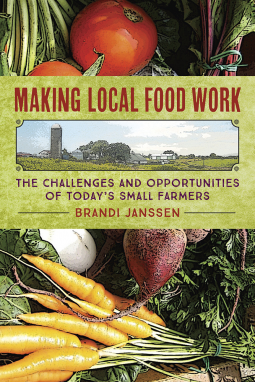
Making Local Food Work
The Challenges and Opportunities of Today's Small Farmers
by Brandi Janssen
This title was previously available on NetGalley and is now archived.
Send NetGalley books directly to your Kindle or Kindle app
1
To read on a Kindle or Kindle app, please add kindle@netgalley.com as an approved email address to receive files in your Amazon account. Click here for step-by-step instructions.
2
Also find your Kindle email address within your Amazon account, and enter it here.
Pub Date Apr 15 2017 | Archive Date May 01 2017
University of Iowa Press | University Of Iowa Press
Description
By listening to and working alongside people trying to build a local food system in Iowa, Janssen uncovers the complex realities of making it work. Although the state is better known for its vast fields of conventionally grown corn and soybeans, it has long boasted a robust network of small, diverse farms, community supported agriculture enterprises, and farmers’ markets. As she picks tomatoes, processes wheatgrass, and joins a parents’ committee trying to buy local lettuce for a school lunch, Janssen asks how small farmers and CSA owners deal with farmers’ market regulations, neighbors who spray pesticides on crops or lawns, and sanitary regulations on meat processing and milk production. How can they meet the needs of large buyers like school districts? Who does the hard work of planting, weeding, harvesting, and processing? Is local food production benefitting rural communities as much as advocates claim?
In answering these questions, Janssen displays the pragmatism and level-headedness one would expect of the heartland, much like the farmers and processors profiled here. It’s doable, she states, but we’re going to have to do more than shop at our local farmers’ market to make it happen. This book is an ideal introduction to what local food means today and what it might be tomorrow.
Advance Praise
“Janssen has a great gift for making complex issues understandable to a wide range of readers. Making Local Food Work provides the reader with very understandable stories that reveal the actual experiences of farmers and all the parties they work with and relate to without oversimplifying the issues.”(Frederick Kirschenmann, farmer and president of the board of the Stone Barns Center for Food and Agriculture)
“Making Local Food Work really focuses on a missing piece in much of the local foods literature: the pieces along the value chain between the farmer and the consumer. Janssen also recognizes that conventional and local food systems share a lot in common.”(Craig Chase, Leopold Center for Sustainable Agriculture)
Available Editions
| EDITION | Paperback |
| ISBN | 9781609384920 |
| PRICE | $27.50 (USD) |
| PAGES | 230 |
Links
Featured Reviews
 Bonnye Reed F, Reviewer
Bonnye Reed F, Reviewer
I received a free electronic copy of this How-To book from Netgalley, Brandi Janssen and University of Iowa Press in exchange for an honest review. Thank you all, for sharing your hard work with me.
This is an excellent outline of the benefits and problems of obtaining fresh produce in your community and what we have to do to make this the most effective way to feed our families safe, non-polluted and non-GMO fruits and vegetables. This is a book I will want to purchase for my friends and farmers - excellent advice. Thank you Brandi Janssen for sharing this info with us. The advice is timely and the photos mouth-watering.
 Jan H, Reviewer
Jan H, Reviewer
This is an excellent and honest look at food choices and how it dictates farm choices. Finally someone sees the intensive work at selling at farmer's markets and why that alone is bit one step into small farm support. Many criticize the food supply but demand more expenses in the chain. Many choose solely on price. And a wide range of choices in between that need people active. Although I received a reading copy via NetGalley, it's been widely shared as information people need to know. It's needed because effective support is critical
Readers who liked this book also liked:
Jennifer Chiaverini
General Fiction (Adult), Parenting & Families, Women's Fiction
William Stixrud, PhD; Ned Johnson
Health, Mind & Body, Nonfiction (Adult), Parenting & Families


















